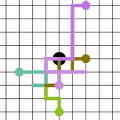Complex systems, abstractly represented as networks, are ubiquitous in everyday life. Analyzing and understanding these systems requires, among others, tools for community detection. As no single best community detection algorithm can exist, robustness across a wide variety of problem settings is desirable. In this work, we present Synwalk, a random walk-based community detection method. Synwalk builds upon a solid theoretical basis and detects communities by synthesizing the random walk induced by the given network from a class of candidate random walks. We thoroughly validate the effectiveness of our approach on synthetic and empirical networks, respectively, and compare Synwalk's performance with the performance of Infomap and Walktrap. Our results indicate that Synwalk performs robustly on networks with varying mixing parameters and degree distributions. We outperform Infomap on networks with high mixing parameter, and Infomap and Walktrap on networks with many small communities and low average degree. Our work has a potential to inspire further development of community detection via synthesis of random walks and we provide concrete ideas for future research.
翻译:以网络形式抽象地呈现的复杂系统在日常生活中无处不在。分析和理解这些系统需要社区检测工具等工具。由于没有单一的最佳社区检测算法,因此,在各种各样的问题环境中,强健性是可取的。在这项工作中,我们介绍一个随机的步行社区检测方法Synwalk。协同行走建立在坚实的理论基础上,通过综合某一类候选人随机行走的网络随机行走对社区进行检测。我们彻底验证了我们在合成网络和实验网络上的做法的有效性,并将Synwalk的性能与Infomap和行走陷阱的性能进行比较。我们的结果表明,Synwalk在具有不同混合参数和程度分布的网络上表现强劲。我们在与许多小社区和低平均程度的网络上超越了信息地图。我们的工作有可能通过随机行走的合成促进社区检测的进一步发展,并为今后的研究提供具体想法。



